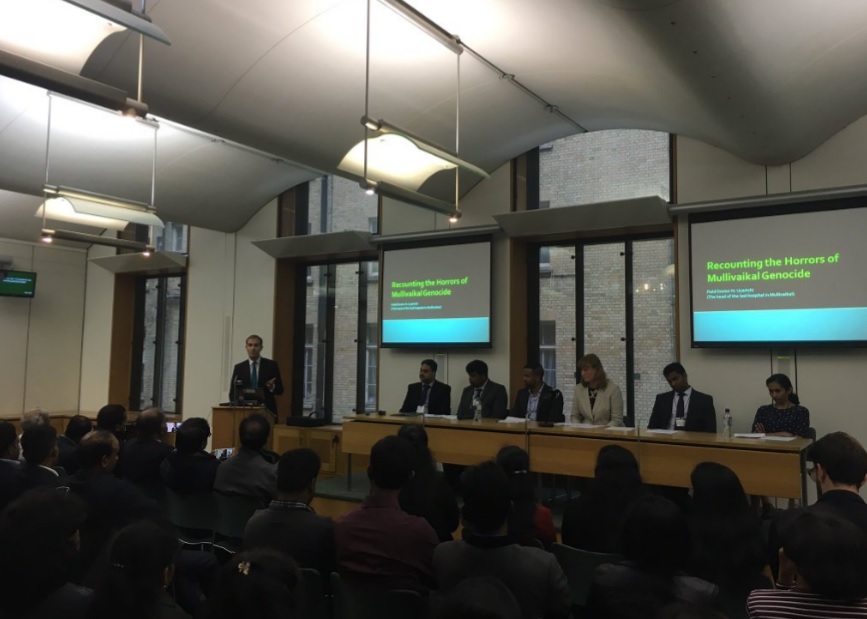 |
| Photograph: Tamil Guardian |
“What happened to Tamils in Sri Lanka is Genocide,” said Member of Parliament for Enfield Joan Ryan and vice chair of the All Party Parliamentary Group for Tamils (APPG-T), speaking at a Mullivaikal remembrance event at the House of Commons on Tuesday.
See live tweets from the event here.
The event which was organised by the Tamil Co-ordinating Committee (TCC), saw a cross-party turn-out from MPs.
Condemning ongoing torture of Tamils in Sri Lanka, the chair of the All Party Parliamentary Group for Tamils MP for Kingston and Surbiton James Berry, said, “We must also shine a spot light on the disgraceful and continuing practice of torture. Whether or not it is sponsored at the highest level, it is taking place in Sri Lanka – last year, last month and probably yesterday. It is taking place frequently and Freedom From Torture produced a compelling report on this.”
Mr Berry highlighted the need for the Prevention of Terrorism Act (PTA) to be repealed whilst stressing the need to pressure Sri Lanka to demilitarise the Tamil homeland in the North-East of Sri Lanka.
MP for Ilford North Wes Streeting, lamenting that the world looked away and did not act fast enough in 2009, reiterated his commitment to ensuring that the UNHRC resolution is fully implemented, adding,
“We have not taken our eye of the ball in ensuring the resolution is implemented. Plenty of parliamentarians who will not look away this time.”
“It is important Sirisena knows that the international community is watching,” he concluded.
MPs that attended the event heard the compelling experiences of Dr Navaratnarajah Uyatchi, who was heading the last hospital in Mullivaikkal until the early hours of May 17th.
Dr Uyatchi reiterated that he witnessed the Sri Lankan airfore drop chemical weapons within the vicinity of the hospital.
The son of the killed Liberation Tiger of Tamil Eelam (LTTE) political head Nadesan, recounted finding out that his father and mother and been tortured and killed despite surrendering to Sri Lanka’s military through an internationally arranged white flag surrender process.
Responding to the harrowing accounts of May 2009, MP Joan Ryan said,
“Unless we hear this kinds of testimony that makes us realise inside ourselves what we mean when we talk about war crimes and what prices have been paid. Unless we have that kind of accountability, then we do not get a lasting peace. That’s why we must keep striving for what the UN Human Rights Council has told Sri Lanka must happen.”
Adding context to the event, Dr Madurika Rasaratnam of Kent University reminded MPs that the armed conflict was symptomatic of Sri Lanka’s inability to structurally change to accommodate Tamil aspirations and address grievances.
Dr Rasaratnam added that Sri Lanka’s commitment to the UNHRC resolution was only possible due to sustained international pressure it received.
Noting that since Sri Lanka’s change of governance, “there is some resistance in the international community to accept that the new government may not deliver,” Dr Rasaratnam added,
“The actions of the new government make this even clearer as time passes. Sri Lanka will not change without sustained pressure.”
Responding to questions on whether the Conservative party would follow Labour in officially supporting the Tamil aspirations of self-determination, the British Tamil Conservative Chair said in private many current government ministers supported the Tamil political aspirations in Sri Lanka.
The event ended with concluding remarks from the co-editor of the Tamil Guardian Sivakami Rajamanoharan who highlighted that “the recent spate of arrests of Tamils in the North-East reiterate that even 7 years on they are confronted with a climate of intimidation and torture that does not allow them to mourn their dead.”
